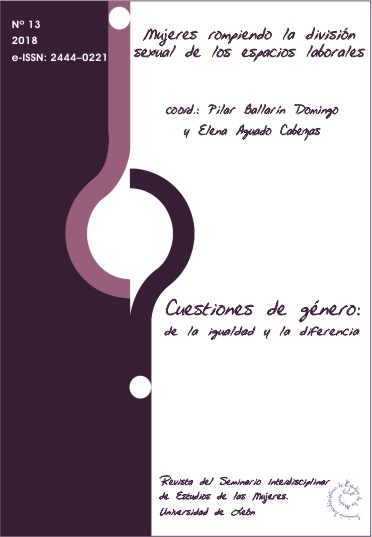Acquirit qui tuetur: Hali Meiðhad and Medieval Women’s Liberation through Virginity = Acquirit qui tuetur: Hali Meiðhad y la Liberación de la Mujer Medieval a través de la Virginidad
DOI:
https://doi.org/10.18002/cg.v0i13.5379Palabras clave:
Sponsalia Christi, Imitatio Christi, Katherine Group, Ancrene Wisse, Feminine Virilis, VirginityResumen
This article joins a vibrant conversation about the concept of virginity and its relevance in the process of women’s self-liberation during medieval times. The aim of this project is to shed some light on the concept of virginity and to analyse its interpretation in a time in which it was almost compulsory to follow society’s patriarchal pattern. The study begins with a historical framework of this idea of corporeal sacredness followed by a new approach in which the contemporary perception is shattered. This article analyses the sociological and religious relevance of an idea conceived as the paramounts of holiness – thus proposing an alternative approach in which it is a defense weapon and not as a way of oppressing the female sex.
Descargas
Métricas alternativas
Citas
Atkinson, Clarissa (1983): “"Precious Balsam in a Fragile Glass": the Ideology of Virginity in the Later Middle Ages”. In: Journal of Family History, vol. 8, pp. 131-43.
Bennett, Judith (2000): “"Lesbian-Like" and the Social History of Lesbianisms”. In: Journal of the History of Sexuality, vol. 9, nº. 1/2, pp. 1-24. Available in: http://www.jstor.org/stable/3704629 [11/05/2018].
Blair, Peter Hunter (1956): An introduction to Anglo-Saxon England. Cambridge, UK: Cambridge University Press. Print.
Green, Dennis Howard (2014): Women and Marriage in German Medieval Romance. Cambridge, UK: Cambridge University Press.
Eder, Jens (2000): Performing Virginity and Testing Chastity in the Middle Ages. Routledge. Print.
Fremantle, William Henry (1982): St. Jerome: Letters and Select Works, tr. Select Library of Nicene and Post-Nicene Fathers, ser. 2, vol. VI. Edinburgh, UK: Edinburgh University Press. Available in: http://oll.libertyfund.org/titles/schaff-a-select-library-of-the-nicene-and-post-nicenefathers-of-the-christian-church-vol-1 [11/05/2018].
Lang, Peter (2011): The Katherine group a three manuscript parallel text: Seinte Katerine, Seinte Marheret, Seinte Iuliene, and Hali Meiđhad. Oxford, UK: Oxford University Press.
Millett, Bella and Jocelyn Wogan-Browne (1992): Medieval English prose for women: selections from the Katherine group and Ancrene Wisse. Oxford, UK: Clarendon Press.
Salih, Sarah (2001): Versions of Virginity in Late Medieval England. Suffolk, UK: D.S. Brewer
Warner, Marina (1976): Alone of all her sex: the myth and the cult of the Virgin Mary. New York: Knopf.
Williams, Claire Manon (2015): From the Holy Land to the Cloister: The Decline of Female Ascetic Pilgrimages in the Early Medieval West. Colorado: University of Colorado. Available in: https://scholar.colorado.edu/cgi/viewcontent.cgi?article=2076&context=honr_theses [11/05/2018].
Descargas
Publicado
Cómo citar
Número
Sección
Licencia
Derechos de autor 2018 Laura Rodriguez Pupo

Esta obra está bajo una licencia internacional Creative Commons Atribución-NoComercial-CompartirIgual 4.0.
L@s autores/as que publican en esta revista están de acuerdo con los siguientes términos:
1. L@s autores/as ceden de forma no exclusiva los derechos de explotación (reproducción, distribución, comunicación pública, transformación) a la Universidad de León, por lo que pueden establecer, por separado, acuerdos adicionales para la distribución no exclusiva de la versión de la obra publicada en la revista (por ejemplo, alojarlo en un repositorio institucional o publicarlo en un libro), con un reconocimiento de su publicación inicial en esta revista.
2. Este trabajo se encuentra bajo la Creative Commons Attribution-NonCommercial-ShareAlike 4.0 International License. Puede consultarse desde aquí la versión informativa y el texto legal de la licencia.
3. Se permite y se anima a l@s autores/as a difundir electrónicamente las versiones pre-print (versión antes de ser evaluada) y/o post-print (versión evaluada y aceptada para su publicación) de sus obras antes de su publicación, ya que favorece su circulación y difusión más temprana y con ello un posible aumento en su citación y alcance entre la comunidad académica.
Cuestiones de Género utiliza exclusivamente la licencia Atribución-NoComercial-CompartirIgual 4.0 Internacional (CC BY- NC-SA 4.0).
Bajo los siguientes términos:
- Atribución: Usted debe dar crédito de manera adecuada , brindar un enlace a la licencia, e indicar si se han realizado cambios . Puede hacerlo en cualquier forma razonable, pero no de forma tal que sugiera que usted o su uso tienen el apoyo de la licenciante.
- No Comercial: Usted no puede hacer uso del material con propósitos comerciales .
- Compartir Igual: Si remezcla, transforma o crea a partir del material, debe distribuir su contribución bajo la la misma licencia del original. cualquier uso permitido por la licencia.
No hay restricciones adicionales — No puede aplicar términos legales ni medidas tecnológicas que restrinjan legalmente a otras a hacer
L@s autores/as pueden consultar los derechos de copyright y las condiciones de autoarchivo en el directorio Dulcinea.











